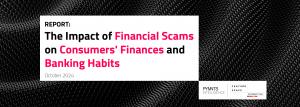New research reveals that three in ten U.S. consumers have lost money to scams since 2020 with identity theft the most common and romance scams the most costly.
• Average amount lost by victims of scams reaches $545 with more than one in ten (13%) victims losing over $10,000
• 59% of scam victims say enhanced fraud detection and monitoring technologies are the most important safeguard to tackling fraud and financial crime
Almost 80 million U.S. consumers have lost money to scams over the last five years, according to a new report commissioned by global fraud and financial crime prevention company, Featurespace and conducted by PYMNTS Intelligence on the state of financial crime and scams in the US.
Three in ten (30%) U.S. consumers say they or their households suffered losses after being targeted by scammers. The victims lost an average of $545 with nearly three in ten (27%) losing between $1,000 and $9,999 and more than one in ten (12%) suffering over $10,000 in losses.
The research reveals that the most common type of scam was identity theft, affecting a quarter (24%) of victims. Other prevalent types of scams include gift card scams (affecting 19% of victims), eCommerce including fake websites and fraudulent listings (16%) and debt collection scams (15%).
This national study examined the financial impact of scams on those affected by them, and the consumer’s view of the bank’s role in preventing them across a census-balanced panel of 10,013 US consumers between July 26 and August 26 2024.
The report finds that romance scams had the largest financial impact with average losses of almost $2,000 followed by investment scams which cost victims an average of $1,104. Romance scams also tend to be longer in duration, with scam victims making an average of 3.6 payments — nearly twice as many as other schemes.
On a positive note, the research indicates consumers are able to recover some of their losses from their financial providers. Nearly seven in ten (69%) consumers who reported the scam to their bank recovered a portion of lost funds, with three quarters (74%) of those who filed a claim with their credit card issuer recouping some of their losses.
That said, despite often recovering some or all of their losses, over half (54%) of scam victims said they considered switching banks following a scam incident, with 30% actually doing so. Consumers are also aware of the role continued advances in technology can play in safeguarding their accounts against scams – six in ten (59%) scam victims named integrating fraud detection and monitoring technologies as the most important step to boost consumer protections.
Martina King, CEO at Featurespace, comments: “With millions of U.S. consumers hit with scams over the last few years, financial institutions must continue to enhance consumer protections to fight back against the rising threat of fraud and financial crime.
“Tackling scams should be focused on prevention rather than cure: using technology to identify and prevent scams in real-time by offering increased security measures. Using adaptive behavioural data and artificial intelligence allows financial institutions to protect their clients – stopping fraudulent transactions in milliseconds - without impacting the customer experience or stopping authentic transactions from taking place.”
ENDS
Methodology
Featurespace-commissioned research undertaken by PYMNTS Intelligence with 10,103 consumers. Research conducted from 26th July – 19th August 2024. Consumer sample was balanced to match the U.S. adult population in a set of key demographic variables: 51% of respondents identified as female, 33% had a college degree, 38% earned more than $100,000 annually and 29% were millennials.
Media contact: featurespace@seven-consultancy.com
About Featurespace
Featurespace is a leader in enterprise technology that prevents fraud and financial crime. With a mission to make the world a safer place to transact, Featurespace helps banks and financial institutions protect customers, reducing risk and business operating costs by providing industry-leading machine learning, fraud & financial crime prevention solutions via its award-winning platform.
Featurespace provides innovative solutions using artificial intelligence to help banks and financial institutions crack down on fraud. It has built a model optimised for real-time data analytics, capable of recalibrating in real-time to identify and prevent both existing and new forms of fraud.
Over 80 direct customers and 100,000 businesses have put their trust in Featurespace’s technology including HSBC, NatWest, TSYS, Worldpay, Danske Bank, Akbank, Edenred and Permanent TSB. Founded in 2008, and headquartered in Cambridge, UK, Featurespace has over 400 team members, operating globally from six locations. Learn more at featurespace.com.
Through its partnership with Featurespace, a top digital US bank was able to prevent over 75% of potential fraud losses and saw an 85% improvement in the amount of fraud caught.
About PYMNTS Intelligence
PYMNTS Intelligence is a leading global data and analytics platform that uses proprietary data and methods to provide actionable insights on what’s now and what’s next in payments, commerce and the digital economy. Its team of data scientists include leading economists, econometricians, survey experts, financial analysts and marketing scientists with deep experience in the application of data to the issues that define the future of the digital transformation of the global economy. This multi-lingual team has conducted original data collection and analysis in more than three dozen global markets for some of the world’s leading publicly traded and privately held firms.
Kendra Rogers
Featurespace
+44 1223 345940
email us here
Visit us on social media:
LinkedIn
Legal Disclaimer:
EIN Presswire provides this news content "as is" without warranty of any kind. We do not accept any responsibility or liability for the accuracy, content, images, videos, licenses, completeness, legality, or reliability of the information contained in this article. If you have any complaints or copyright issues related to this article, kindly contact the author above.




